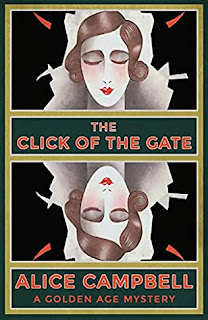Published by Dean Street Press,
6 June 2022.
ISBN: 978-1-915014-92-4 (PB)
The book is set a few years after the end of the First World War and opens with Alan Charnwood and Iris de Bertincourt stealing a last evening together before Charnwood returns to East Africa, to continue his job as an engineer. Iris’ fifteen-year-old daughter, Clare, is acting in a play at her school but Iris made the excuse that she was not feeling well in order to spend the time secretly with Charnwood. The reason for this subterfuge is that Iris’ divorce has not yet been finalised and she is afraid, if Clare knows anything about her mother’s new relationship, she will accidentally let something slip to Iris’ aunt, the Comtesse de Castelmauron.
Charnwood cannot understand why a woman as independent and accomplished as Iris should be so anxious about her aunt’s opinion until she explains about her childhood. After Iris was orphaned, her wealthy, aristocratic aunt took her in and supervised her upbringing and education. The Comtesse is an exceptionally old-fashioned, religious and dominating woman who dictated every aspect of Iris’ life and, until Iris was seventeen, she had never been alone with a man. On her seventeenth birthday her aunt informed her that she was going to marry her cousin, Marcel de Bertincourt. Although shocked by this, Iris was also excited because Marcel was a handsome and charming young man. They married and, nine months later, their daughter, Clare, was born. The couple spent very little time together, first because of the War and afterwards Marcel spent his time and money on other women. Iris cannot regret her marriage because it gave her Clare, but after years of subservience to her aunt, she was encouraged by, Helen Roderick, a dynamic American friend to break free and accept the job she offered her. Now Iris is financially independent of the Comtesse and has her own house, albeit in a rougher area of Paris than her aunt approves of. Iris wants a divorce and Marcel says that he is happy to agree, however, their aunt will not countenance the idea of divorce and she is a woman who is determined to get her way.
The romantic evening the couple had hoped for is interrupted, at first is by a man delivering flowers, which contain a card saying they were sent by Iris’ husband, which, in the circumstances Charnwood finds strange. The second interruption is the Comtesse’s butler phoning to say she has heard that Iris is ill and is on her way to visit her. This means that Charnwood has to leave earlier than he had intended.
Every time someone opens the front gate it makes a loud click, which warns those in the house that somebody has entered or exited. Iris heard the gate click every time her visitors arrived and left, and she heard it click again when Clare arrived and then heard her talking to the family that had given her a lift. The gate clicked shut and Iris waited for her to come in the front door. Clare did not come. In the few seconds it should have taken Clare to walk along the path she has disappeared.
Iris is shattered by her loss and the uncertainty about what has happened to her child and the Comtesse grabs her opportunity and takes Iris back to live with her, once again totally under her control. Although it seems that Clare must have left of her own free will, Iris is adamant that her daughter would never be so cruel as to deliberately leave her worrying and wondering. Charnwood is determined to save the woman he loves from a life of submission and her daughter from whatever fate has overtaken her and applies for an extension to his leave. Assuming Clare has not run away, it seems probable she has been kidnapped for ransom, but when no demand arrives Charnwood suspects those nearest to her, primarily the Comtesse. who has made it clear that she will do anything to force Clare’s parents to reunite and abandon their plans to divorce.
Charnwood is a courageous, loyal and dedicated ally, who will do all he can to save Clare and rescue Iris from emotional bondage, but he has little experience of the cunning ploys of a very clever and ruthless kidnapper. Fortunately, Charnwood can call upon the expertise of his good friend Tommy Rostetter, a journalist in Paris, who has the subtlety and deductive skill that Charnwood lacks. Rostetter is eager to help but, with such a labyrinth of mixed emotions and relationships, it is hard to believe that they can find Clare in time to save her life.
The
Click of the Gate
was originally published in 1932 and has recently been republished. The story
is prefaced by a comprehensive and fascinating introduction by Curtis Evans. It
is basically a stand-alone novel, although Rostetter does appear in three more
of the author’s novels. This is a psychological crime novel which explores the
impact of the disappearance of a child on the mother who adores her. The author
portrays with skill and sensitivity the psychological make up of a woman who
had been raised under ruthless domination and is struggling not to slip back
under her aunt’s control, but, at the same time, will make any sacrifice to
save her child. Charnwood is an engaging, if somewhat credulous protagonist,
and Tommy Rostetter’s lively intelligence lightens the book whenever he
appears. The plot is tense and clever and contains fascinating descriptions of
life in interwar Paris. This is an excellent read, which I recommend for
readers who enjoy Golden Age crime novels.
------
Reviewer:
Carol Westron
Alice Campbell (1887-1955) came originally from Atlanta, Georgia, where she was part of the socially prominent Ormond family. She moved to New York City at the age of nineteen and quickly became a socialist and women’s suffragist. Later she moved to Paris, marrying the American-born artist and writer James Lawrence Campbell, with whom she had a son in 1914. Just before World War One, the family left France for England, where the couple had two more children, a son and a daughter. Campbell wrote crime fiction until 1950, though many of her novels continued to have French settings. She published her first work (Juggernaut) in 1928. She wrote nineteen detective novels during her career.
 Carol
Westron is a successful author and a Creative Writing
teacher. Her crime novels are set both
in contemporary and Victorian times. Her first book The Terminal Velocity of
Cats was published in 2013. Since then, she has
since written 6 further mysteries. Carol recently gave an interview to Mystery
People. To read the interview click on the link below.
Carol
Westron is a successful author and a Creative Writing
teacher. Her crime novels are set both
in contemporary and Victorian times. Her first book The Terminal Velocity of
Cats was published in 2013. Since then, she has
since written 6 further mysteries. Carol recently gave an interview to Mystery
People. To read the interview click on the link below.
https://promotingcrime.blogspot.co.uk/2017/11/carol-westron.html www.carolwestron.com
http://carolwestron.blogspot.co.uk/
To read a review of Carol latest book click on the title
The Curse of the Concrete Griffin





